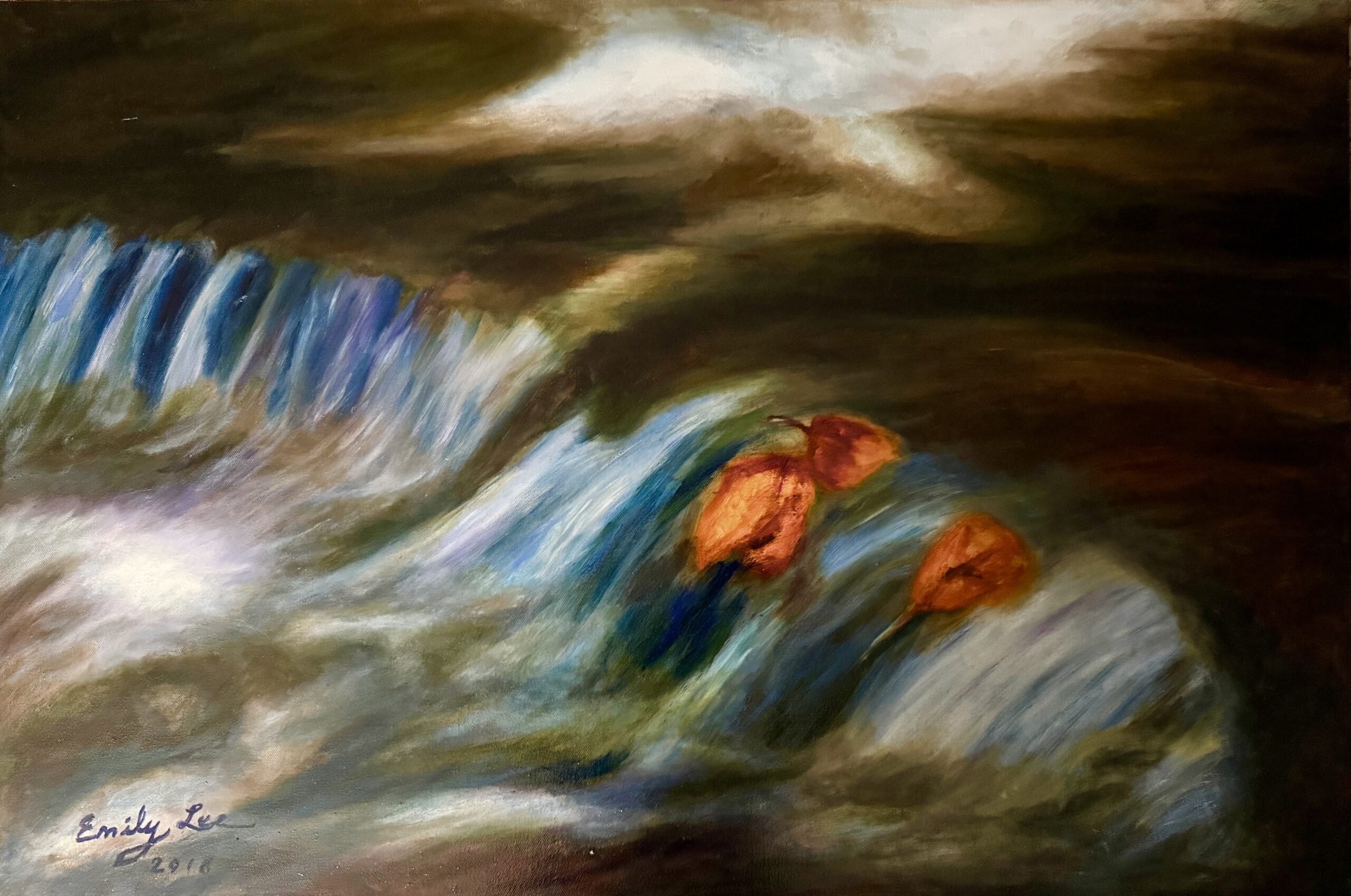林榮峰 | Emily Lee

畫材:油畫 | Media: Oil painting
尺寸:36 “ x 24” | Size: 36”x 24”
夫妻相隨、患難與共
二十年前的今天,2005年8月20日,我們分搭不同班機抵達路易斯安那州的紐奧良市,入住Sheraton飯店。
禮拜四一早李教授就參加一整天的會(當時他是教育部海外唯一顧問),主題是確認美國高中新設的AP華語、日語與韓語的課綱,內容與考試的總體計劃。
我則是自費陪同前來,這是我第一次踏上這座城市。一早,我獨自出門到隔壁的大旅館也是大賭場,很是熱鬧,吃了一頓美食後就出來逛老街,街上有好多家藝廊都是我喜歡的,猶記得看上一幅PINO的畫,愛不釋手,與店主訂購,卻不能決定買多大的,遂約定明天帶先生一起來決定,他卻說要先來電預約?
晚上,我們到一家法式餐廳用餐。牛排鮮嫩滑順,似在吃生魚片的感覺,太滿意了,告訴服務生,明天想再來,卻得到同樣的回應:「要先打電話確認是否營業。」語意不明,我們也未多想。
我們又去預訂星期五早上的「市區觀光團」及下午的「農場參觀團」。週五一早,搭上滿載遊客的小巴,司機一邊開車,一邊介紹沿途風景,但語氣中透著些許隱憂。我們當時不明白,直到最後一站來到當地著名的「白色墓園」,管理員匆忙說:「我們要關門了,颱風快來了。」這才驚覺——司機口中反覆提及的憂慮,原來是怕這座常年被水淹的墓園再度受創。
街上,店家紛紛釘上木板。我們起初以為是整修工程,卻沒意識到那是防災準備。回旅館一打開電視,才驚覺:世紀大颶風Katrina即將來襲!
我們立即聯繫航空公司。我的美航還剩一張$650的回紐約機票;李教授的達美航空則已全面停飛。他一直催要我先走,我卻堅持:「我們要一起面對。」
我們決定留下,請飯店將房間從43樓換至35樓,一張King Size的大床。接著趕去街上採買,僅有一家中餐外賣還營業,買了炸雞、白飯和瓶裝水,藏在高處衣櫃內。浴缸放滿水,也通知女兒我們的情況,持續聯繫。我們將一切交託上主,平靜地靜坐修練,迎接風暴的來臨。
不久,廣播通知住客攜帶枕被至二樓大廳避難。一夜風雨交加、斷電漆黑,Katrina颶風真的來了!
我倆在堅硬冰冷的地板上安然入眠,週六整天風勢越來越強。大廳內的人群開始互動,我與一群來參加六十年校友團聚的美國老太太聊起天,才知道有些人無法蹲下,只能整晚坐著睡,還有人帶著寵物共度難關。
週日雨停,我們走出旅館,大廳外滿目瘡痍,玻璃破損、地板淹水。Sheraton是當時唯一還有服務的旅館,其他高級飯店早已棄守。警察在門口站崗,外頭傳來搶劫消息,許多黑人手中拎著搶來的球鞋。街頭無家可歸者被集中送往體育場,環境惡劣,令人心痛。
在大廳睡了二晚後我們全搬回各自的房間,感謝主,我們已經從43樓搬到35樓了,每餐少走八個樓層!
Sheraton決定開放空房給員工家屬安置。我們從8/23至26日,每天仍能三餐溫飽,所有員工家人都齊心協力。我們每天從35樓走下二樓吃飯,再爬上樓休息,整整四天。後來,食物耗盡,飯店開始向布希政府求援。
8/27早上,我們等候消息,終於聽見李教授的名字。他年滿65歲,屬優先疏散對象。我們七點多登上巴士,但車子直到下午三點才啟動,開往不知地點。晚上短暫停靠Mall吃飯後,又驅車前行,一路漆黑無人知曉去處。
直到8/28清晨四點多,巴士停在德州達拉斯一棟Best Western旅館。我們洗了熱水澡,馬上通知女兒,她立刻幫我們訂了早上七點多飛往紐約的機票。終於,我們平安返家——感謝讚美主!
颱風背後的使命:
當年這趟旅程的起因,是因為美國大學理事會(College Board)決定擴增語言課程,除原有英語、西班牙語、法語、德語、義大利語、拉丁語外,又增設華語、韓語與日語。
中國早已在美國佈局設立孔子學院,也經常邀請華語教授、老師赴中交流,聽到消息後,就捐給大學理事會七十多萬經費,企圖主導AP-Chinese的內容,全面採用簡體字與漢語拼音。
台灣這時才意識到情勢嚴峻,緊急撥出三十多萬經費捐給大學理事會,由教育部邀請李教授代表台灣,加入AP Chinese設立的工作小組。如果工作小組用投票的方式來決定各種議題,結果會是完全不對等的情況。另外一開始中國派來的代表也抗議李教授不是教中文的專材不適合參加,主持人回道:「他是我們特意邀請來幫忙的現任大學教授,我們要聽聽他的意見。」
李教授提問:「我們是要測試學生的華語能力及文化嗎?」考試的方法應該秉持包容性、公平公正,接受各地的華人因爲文化差異,語言用詞也不相似。譬如單單問候語,新加坡人、香港人就是不同,無法單一看待。假如我們考試是用電腦,應該公平的讓學生自由選擇熟悉的字體。」大家無異議的通過。
再下來的拼音輸入法也讓學生自己選擇:用自己習慣的漢語拼音或者通用拼音,也獲無異議通過。
結果使用正體字、簡體字的議題就不用另外討論了!
後記:
一轉眼,二十年過去。如今的紐奧良仍未完全恢復,當年的老街也不復存在。我選擇加入喜來登旁退伍軍人圖書館的重建工程,成為創始會員,以茲紀念。
感謝上帝保守我們平安,也感謝我們曾為守護正體字貢獻心力。這段經歷,也讓我覺得:此生無憾,對子孫後代已有交代。
Together Through Trials and Storms
Twenty years ago today, on August 20, 2005, my husband and I boarded different flights and arrived separately in New Orleans, Louisiana, checking into the Sheraton Hotel.
Early Thursday morning, Professor Lee attended a full-day meeting (at the time, he was the Ministry of Education’s sole overseas adviser). The agenda was to finalize the curriculum frameworks for newly established AP Chinese, Japanese, and Korean courses for U.S. high schools, as well as the overall content and examination plans.
I came along at my own expense—my first time ever setting foot in this city. That morning, I ventured out alone to the large hotel and casino next door, bustling with activity. After enjoying a fine meal there, I wandered into the old streets nearby. Many art galleries lined the way, just my kind of place. I still remember falling in love with a painting by PINO—so much so that I placed an order on the spot. The only undecided matter was the size, so I arranged to return the next day with my husband to choose together. To my surprise, the shopkeeper said I would need to “call ahead” before coming.
That evening, we dined at a French restaurant. The steak was tender and silky—almost like eating sashimi. I was so impressed that I told the waiter I wanted to return the next day, but received the same puzzling reply: “You’ll need to call first to check if we’re open.” The meaning escaped us, and we thought no more of it.
We then booked a Friday morning “city tour” and an afternoon “plantation tour.” On Friday morning, our minibus, full of tourists, set off. The driver narrated the sights along the way, though there was a trace of unease in his tone. We did not understand why—until the last stop at the city’s famous “white cemetery.” The caretaker hurried out to say, “We’re closing up—hurricane’s coming.” Suddenly, we realized the source of the driver’s repeated concern, he feared the cemetery, so often flooded, would be devastated again.
On the streets, shopkeepers were boarding up windows. We assumed it was for renovations, unaware it was disaster preparation. Only when we returned to the hotel and switched on the TV did we discover the truth: the century’s great hurricane—Katrina—was on its way!
We immediately contacted the airlines. I still had one $650 American Airlines ticket to return to New York; Professor Lee’s Delta flights, however, had been completely grounded. He urged me to leave first, but I insisted, “We face this together!”
We decided to stay, asking the hotel to move us from the 43rd floor down to the 35th, to a king-size bed. We rushed to the streets for supplies—only one Chinese takeout shop remained open. We bought fried chicken, rice, and bottled waters, and stashed them high in the closet. We filled the bathtub with water, informed our daughter of the situation, and kept in contact. Placing everything in the Lord’s hands, we sat in quiet meditation, ready to meet the storm.
Soon, an announcement instructed guests to bring pillows and blankets to the second-floor ballroom for shelter. That night, with howling winds, pounding rain, and a blackout, Hurricane Katrina arrived.
We slept soundly on the hard, cold floor. By Saturday, the winds had grown stronger. In the ballroom , people began to talk with one another. I chatted with elderly American ladies attending a 60-year class reunion; some could not squat and had to sleep sitting up, and others had brought pets to share the ordeal.
By Sunday, the rain stopped. Stepping outside, we saw devastation—shattered glass, flooded floors. The Sheraton was the only hotel still functioning; other luxury hotels had been abandoned. Police guarded the entrance, while news of looting spread—many young Black men were seen carrying stolen sneakers. Homeless people were being herded into the sports stadium under harsh conditions; the sight was heartbreaking.
After two nights in the ballroom, we were allowed to return to our rooms. Thank the Lord—we were already on the 35th floor, saving us eight flights of stairs each way for meals.
The Sheraton opened its empty rooms to house employees’ families. From August 23 to 26, we still had three meals a day, everyone working together in solidarity. Each day we walked down from the 35th floor to the second for meals, then climbed back up to rest—for four days straight. Eventually, food ran out, and the hotel began appealing to the Bush administration for help.
On the morning of August 27, we waited for news. Finally, we heard Professor Lee’s name—at age 65, he qualified for priority evacuation. We boarded a bus after 7 a.m., but it did not depart until 3 p.m., heading for an unknown destination. That night, we stopped briefly at a mall for food before continuing into the darkness.
It was not until about 4 a.m. on August 28 that the bus stopped at a Best Western in Dallas, Texas. We took hot showers and immediately called our daughter, who booked us seats on a 7 a.m. flight to New York. At last, we returned home safely—praise the Lord!
The Mission Behind the Storm
This trip had begun because the College Board decided to expand its language offerings. In addition to English, Spanish, French, German, Italian, and Latin, they were adding Chinese, Korean, and Japanese.
China had long been laying groundwork in the U.S. through Confucius Institutes, frequently inviting Chinese-language professors and teachers to China for exchanges. Upon hearing the news, they donated over US$700,000 to the College Board, aiming to shape the AP Chinese curriculum entirely around simplified characters and Hanyu Pinyin.
Taiwan realized the seriousness of the situation too late, hastily contributing over US$300,000 to the College Board. The Ministry of Education invited Professor Lee to represent Taiwan on the AP Chinese task force. Voting on issues could have been entirely lopsided; moreover, China’s delegates initially objected to his participation, arguing that he was not a Chinese-language specialist. The chair responded: “He is a current university professor whom we specifically invited to help—we want to hear his perspective.”
Professor Lee asked, “Are we testing students’ Chinese proficiency and cultural knowledge? Then our exam must be inclusive, fair, and respectful of differences in language use among Chinese communities worldwide. For example, even basic greetings differ between Singaporeans and Hongkongers; we cannot treat them as identical. If the exam is computer-based, students should be free to choose the character set they are familiar with.” The motion passed unanimously.
Next came the issue of phonetic input systems: students could choose Hanyu Pinyin or Tongyong Pinyin—again passed without objection. As a result, there was no need to debate the choice between traditional and simplified characters—the principle of choice was already established.
Postscript
In the blink of an eye, twenty years have passed. New Orleans has fully recover, though the old streets we knew are gone. I chose to join the rebuilding of the Veterans’ Library next to the Sheraton, becoming a founding member in remembrance.
I thank God for keeping us safe, and I am grateful we were able to help safeguard the use of traditional Chinese characters. This experience leaves me with no regrets—I have fulfilled my responsibility to the next generations.
